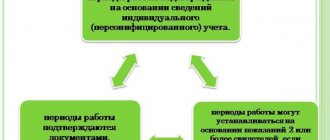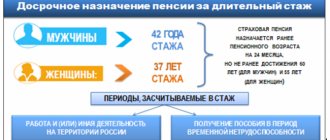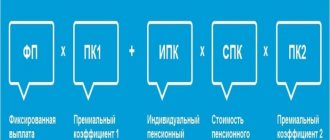What is considered a non-insurance period when calculating a pension?
According to Art. 12 of Federal Law No. 400-FZ “On Insurance Pensions” dated December 28, 2013, non-insurance periods include:
- caring for a child until he reaches the age of 1.5 years, but not more than 4.5 years in total;
- caring for a disabled person of group I, a disabled child or a person over 80 years old;
- residence of spouses of military personnel performing military service under a contract, together with their spouses, in areas where they did not work due to lack of employment opportunities (for a total period of no more than 5 years);
— temporary removal from office (work) due to unfounded criminal prosecution and subsequent rehabilitation;
- military service, service in internal affairs bodies, the State Fire Service, agencies for control of the circulation of narcotic drugs and psychotropic substances, institutions and bodies of the penal system, other service during which compulsory pension insurance did not apply.
What applies to non-insurance periods?
The non-insurance period can be called a period of time during which, due to socially significant reasons, an individual was not able to work. The Federal Law “On Insurance Pensions” dated December 28, 2013 No. 400-FZ, namely Article 12, contains an exhaustive list of non-insurance periods that can be included in the insurance period:
- completion of military service, as well as other service equivalent to it (coefficient 1.8);
- receipt of compulsory social insurance benefits during the period of temporary disability (coefficient 1.8);
- care of one of the parents for each child until he reaches the age of one and a half years, but not more than six years in total (the coefficient for caring for the first child until he reaches the age of 1.5 years is 1.8; the coefficient for caring for the second child until he reaches the age of they are 1.5 years old - 3.4; the coefficient for caring for the third and fourth child until they reach the age of 1.5 years is 5.6);
- receipt of unemployment benefits, participation in paid public works and the period of moving or resettlement in the direction of the state employment service to another area for employment (coefficient 1.8);
- detention of persons unjustifiably prosecuted, unjustifiably repressed and subsequently rehabilitated, and serving their sentences in places of imprisonment and exile (coefficient 1.8);
- care provided by an able-bodied person for a group I disabled person, a disabled child or a person who has reached the age of 80 (coefficient 1.8);
- residence of spouses of military personnel serving under contract with their spouses in areas where they could not work due to lack of employment opportunities, but not more than five years in total (coefficient 1.8);
- residence abroad of spouses of employees sent to diplomatic missions and consular offices of the Russian Federation, but not more than five years in total (coefficient 1.8);
- the period of time included in the insurance period in accordance with the Federal Law “On Operational-Investigative Activities” dated August 12, 1995 No. 144-FZ (coefficient 1.8);
- the period of time during which persons who were unjustifiably prosecuted and subsequently rehabilitated were temporarily suspended from office (work) in the manner established by the criminal procedural legislation of the Russian Federation (coefficient 1.8).
A mandatory legal requirement for calculating points for a non-insurance period is the presence of insurance coverage before and (or) after a socially significant period, i.e. a citizen cannot be unemployed and not registered with the Federal Labor and Employment Service.
Are points awarded for non-insurance periods?
Pension points are awarded for non-insurance periods. In one calendar year a person can receive:
1.8 points - for the period of military service under conscription;
Question answer
How are pensions indexed for working pensioners after dismissal?
1.8 points - for the period of residence of spouses of military personnel serving under contract in areas where they did not work due to lack of employment opportunities;
1.8 points - for the period of unjustified detention;
1.8 points - for the period of caring for a disabled child, a disabled person of group I;
1.8 points - for the period of care by one of the parents for the first child up to 1.5 years;
3.6 points - for the period of care by one of the parents for the second child up to 1.5 years;
5.4 points - for the period of care by one of the parents for the third (fourth) child up to 1.5 years.
This number of points will be awarded if the citizen did not work during this period. If, for example, a person worked while on parental leave, he will be able to choose which points to use when calculating his pension: for work or for the non-insurance period.
Non-insurance periods are included in the length of service and calculation of the pension amount
In connection with the dissemination of inaccurate information on Internet resources about the exclusion of non-insurance periods from the work experience, the PFR Branch for Tatarstan draws attention to the fact that, in accordance with current legislation, periods such as caring for a child up to one and a half years old, military service, caring for a disabled child and a disabled person of the 1st group since childhood, a pensioner who has reached the age of 80, are included in the insurance period, despite the fact that the citizen did not work at that time.
Moreover, for each year of such a period, a citizen is awarded a certain number of points. For example, for caring for the first child – 1.8 points, for the second – 3.6 points, for the third and fourth – 5.4 points; for each year of conscription in the army - 1.8 points.
These periods are included in the length of service if they were preceded or followed by periods of work, regardless of their duration. There will be no changes in the procedure for calculating length of service when assigning a pension, including taking into account non-insurance periods. In the Republic of Tatarstan, when applying for an insurance pension, cases of refusal to offset non-insurance periods have not been registered.
IMPORTANT! Since 2020, a new basis for early retirement from an old-age insurance pension has appeared. To do this, citizens must have a long insurance period: for men - at least 42 years, for women - at least 37 years. This norm allows you to retire 2 years earlier than the new retirement age, but not earlier than 60 years for men and 55 years for women.
Note that in this case, only periods of work and temporary disability (sick leave) are included in the length of service. But time spent caring for a child and military service are not included in the long insurance period that gives the right to early retirement.
However, these and other periods (for example, caring for a disabled person; residence of spouses of military personnel serving under contract in areas where they could not find employment) are assessed in pension points and are included in the insurance period when determining the amount of the pension. Therefore, all pension rights of citizens are taken into account when assigning pensions for long service: some periods are used to determine the right to a pension, others are used to calculate the amount of the pension.
“We strongly recommend that you trust only the information posted on the official website of the Pension Fund of Russia and in its official accounts on social networks,” said Eduard Vafin, Manager of the Pension Fund for the Republic of Tatarstan.
Periods for calculating the insurance period
The insurance period includes periods of work and other activities on the territory of the Russian Federation, provided that during these periods insurance contributions were paid to the Pension Fund of the Russian Federation. These are the so-called periods included in the insurance period. Insurance premiums for a citizen are paid by his employer. Therefore, the main feature of these periods included in the insurance period is that the citizen worked officially during these periods.
We invite you to familiarize yourself with: Temporary disability benefits paid at the expense of the employer, accounting and taxation
However, there are other periods when a citizen did not work and insurance contributions to the Pension Fund were not paid for him. Such periods can be counted towards the insurance period. These are the so-called “non-insurance periods” that are counted towards the insurance period. Those. When assigning an insurance pension, these non-insurance periods are also taken into account.
The concept of insurance experience is broader than labor experience. In the latter, a properly formalized employment relationship with the employee is accepted. To calculate the insurance period, you need to take into account:
- The time of military and equivalent service. Applicable to the penal system, police service, state drug control, fire service, etc.
- Time of forced incapacity for work with the obligatory condition of issuing sick leave, the payment of which also depends on the calculation of the insurance period.
- Child care (including guardianship) up to one and a half years old. If there are several such leaves, only 4.5 years will be included in the insurance period, even if the total was more.
- Periods of registration at employment agencies and receiving unemployment benefits, as well as periods of moving to a new place of work with a referral from a state employment agency.
- Terms of care for disabled people of group I, children with disabilities, as well as for elderly people aged 80 and older.
- Periods of unjustified detention in places of detention, as well as the time of repression during further rehabilitation.
- Cases when spouses of military personnel stayed at the place of service of the spouse liable for military service, without being able to get a job. Only 5 years of insurance experience are taken into account, even if there are more of them in total.
- Spouses of Russians sent by the state to work in other countries for diplomatic, business or representative purposes have the same rights.
- A maximum period of five years of such stay abroad can be counted in the calculation.

All eight cases presented above will be included in the insurance period under one condition: if immediately before or immediately after the indicated periods, work or other activities were carried out, from which insurance funds were transferred to the Pension Fund.
What surcharges are there?
The pension legislation in force since 2020 establishes the size of the pension depending on the value of the pension coefficient (or, as it was previously called, pension points).
The amount of points depends on the amount of insurance contributions for compulsory pension insurance that was transferred for this person. Each pension point in 2020 is converted into a pension at the “rate” of 87.24 rubles, in 2020 it will be 93 rubles
.
However, since 2020, it has become possible to take into account some non-insurance periods
, in particular:
- completing compulsory military service;
- period of child care until he reaches the age of 1.5 years;
- period of receiving unemployment benefits;
- period of caring for an elderly person (over 80 years old) or a disabled person, etc.
Some of these periods give the right not only to the insurance period (which is now, in fact, needed only in order to gain the minimum for retirement), but also to a certain number of pension points.
In particular, for non-insurance periods included in the insurance period, you can receive:
Read also: Working pensioners can receive a 30% increase. But this is just an idea, and there are no specifics 3
- for each year of military service - 1.8 points;
- for each year of caring for an elderly or disabled person – 1.8 points;
- for each year of caring for the first child – 1.8 points;
- for each year of caring for a second child – 3.6 points;
- for each year of caring for a third and subsequent child – 5.4 points.
In this case, child care points are awarded for periods of no more than 1.5 years for each child and no more than 6 years in total
(although there have recently been initiatives to abolish this limit).
Points are awarded only for those non-insurance periods that are included in the insurance period, and they are included in the length of service provided that they were preceded or followed by periods of work
.











